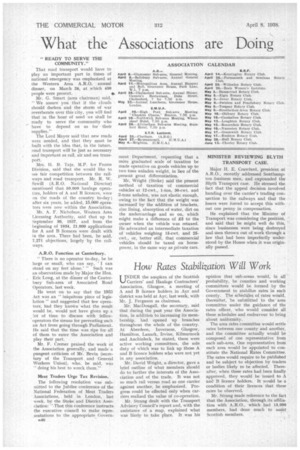What the Associations are Doing
Page 74

If you've noticed an error in this article please click here to report it so we can fix it.
"READY TO SERVE 'THE COMMUNITY."
That road transport would have to play an important part in times of national emergency was emphasized at the Western Area A.R.O. annual dinner, on March 26, at which 450 people were present. Mr. G. Smart (area chairman) said, " We assure you that if the clouds should darken and the storm of war reverberate over this city, you will find that m the hour of need we shall be ready to serve the community who have to depend on us for • their supplies."
The Lord Mayor said that new roads were needed, and that they must be built with the idea that, in the future, road transport will be just as necessary and important as rail, air and sea transport.
Mrs. H. B. Tate, M.P. for Frame Division, said that she would like to Fee fair competition between the railways and road transport. Mr. R. W. Sewill (A.R.O. National Director) mentioned that 50,000 haulage operators, holders of A and B licences, were on the roads of the country to-day ; after six years, he added, 15,000 operators were now within the Association.
Mr. A. F. Nicholson, Western Area Licensing Authority, said that up to September 30, 1937, and from the beginning of 1934, 21,000 applications for A and B licences were dealt with in the area. There had been, he said, 7,271 objections, largely by the railways.
• A.R.O. Function at Canterbury.
" There is no operator to-day, be he large or small, who can say, ' I can stand on my feet alone.' " Such was an observation made by Major the Hon. Eric Long, at the dinner of the Canterbury Sub-area of Associated Road Operators, last week.
He went on to say that the 1933 Act was an "iniquitous piece of legislation" and suggested that few operators, had they known what the result would be, would not have given up a lot of time to discuss with fellow. operators the means for preventing such an Act from going through Parliament. He said that the time was ripe for all of them to enter the Association and play their part.
Mr. F. Cremer praised the work of the Association generally, and made a pungent criticism of Mr. Bevin (secretary of the Transport and General Workers Union), who, he said, was " doing his hest to wreck them."
Meat Traders Urge Tax Revision. The following resolution was sub. mated to the Jubilee conference of the National Federation of Meat Traders Associations, held in London, last week, by the Stoke and District Association: "-That this conference instructs the executive council to make representations to the appropriate Govern 1;40 ment Department, requesting that a more graduated scale of taxation be made operative on goods vehicles up to two tons unladen weight, in lieu of the present great differentiation.
Mr. Wright (Stoke) said the present method of taxation of commercial vehicles at 12-cwt., 1-ton, 30-cwt. and 2-tons unladen, was not elastic enough, owing to the fact that the weight was increased by the addition of brackets, zinc lining, absorption of water, dirt on the undercarriage and so on, which might make a difference of £5 to the owner when the vehicle was retaxed. He advocated an intermediate taxation of vehicles weighing 15-cwt. and 25cwt., or, better still, that commercial vehicles should be taxed on horsepower, in the same way as private cars. MINISTER REVIEWING BLYTH TRANSPORT CASE.
Major H. E. Crawfurd, president of A.R.O., recently addressed Southampton business men, and expounded the Blyth Transport case. He stressed the fact that the appeal decision involved handing over the carrier's trading connection to the railways and that the losers were forced to accept this without one penny in compensation.
He explained that the Minister of Transport was considering the position, and said that he might well do this, since businesses were being destroyed and men thrown out of work through a law that had been imperfectly understood by the House when it was originally passed.






















































































































